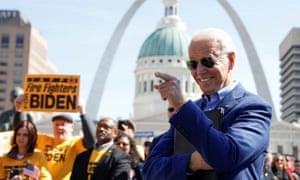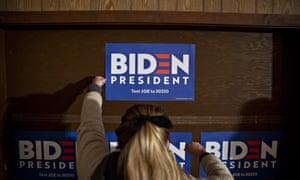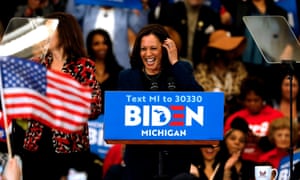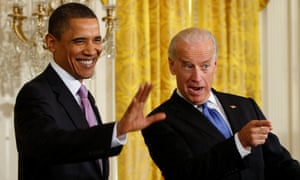Biden has taken an unusual approach, gamely answering questions about his search for a vice-president – a role he knows intimately

Photograph: Brendan McDermid/Reuters
Long before Joe Biden became the presumptive Democratic nominee, he was welcoming recommendations for his vice-presidential running mate. At campaign rallies, town halls and, more recently, virtual fundraisers, Biden has gamely engaged the subject, answering questions about his search, naming potential contenders and describing in detail what he is looking for in a partner, and, potentially, a successor.
His approach is unusual. The process of selecting a running mate is typically shrouded in deep secrecy. But, as Biden likes to remind voters, it’s a role he knows intimately. Having served two terms as Barack Obama’s vice-president, this is a decision he believes will shape not only his campaign, but also his presidency.
“The first and most important quality is someone who, if I were to walk away immediately from the office for whatever reason, that they can be president and the public could look at that person and say: ‘She is capable of being president of the United States tomorrow,’” Biden said last week in an appearance on CBS’s The Late Late Show with James Corden.
Though Biden is still in the early stages of the selection process – he insists he’s months away from making a final decision – his public dialogue has provided real-time insight into what past nominees have christened their “first presidential act”.
The decision – typically the result of an extensive vetting process that takes into account biography and geography, personal chemistry and governing experience – has been further complicated by the coronavirus pandemic, which has decimated the economy and killed more than 53,000 Americans.
“By then, we will likely be in some form of economic crisis or recovery and the vice-president will be Joe Biden’s partner in charting a path forward for the county,” said Karen Finney, a Democratic strategist who was a senior adviser for Hillary Clinton’s 2016 presidential campaign.
Breaking with precedent, Biden has committed to picking a woman as his running mate.
There is a strong political argument for putting a woman on the ticket. Women are among Donald Trump’s most vocal opponents. A CNN poll this month found Biden leading the president by 30 percentage points among women. And during his presidency, Democratic women have voted, organized and run for office in historic numbers.
Biden’s pledge to choose a woman also reflects a frustration that the most diverse field of presidential candidates in American history yielded a 77-year-old white man as its nominee. A recent survey by the Pew Research Center found that 41% of Democratic registered voters say they are bothered that the likely Democratic nominee for the 2020 election is a “white man in his 70s”.

Biden has acknowledged his age is a factor. He would be the oldest president ever inaugurated, at 78, and has said he will choose a younger running mate.
Stressing the importance of governing experience and leadership, Biden has also said he wants someone who is prepared to step into the presidency on “Day One” in the event that his health deteriorates or, in his words, “lightning strikes and I die”.
He plans to announce an advisory panel to oversee his search by 1 May. That team will likely narrow the pool to between two and five candidates, he has said.
Though Biden has been coy about his preferences, he has been consistent in his requirement that his running mate be someone he “completely trusts” to carry out his agenda yet is unafraid to challenge him on major decisions.
In an interview last week, Biden told a Pittsburgh radio station that he would select Michelle Obama as his running mate “in a heartbeat” but suspected that she has no “desire to live near the White House again”.
Among those repeatedly mentioned as possibilities are his former rivals: Senators Kamala Harris of California, Amy Klobuchar of Minnesota and Elizabeth Warren of Massachusetts. Also rumored to be in contention are Michigan’s governor, Gretchen Whitmer, who Biden said “made my list” months before she became a prominent national leader confronting the coronavirus, and Stacey Abrams, the 2018 Democratic nominee for governor in Georgia.

Biden is facing intensifying pressure, including from some of his most prominent allies, to choose a woman of color. There is a particularly strong push for him to choose a black woman to energize African American voters in November and demonstrate that the party does not take for granted its most reliable constituency.
The South Carolina congressman Jim Clyburn, whose endorsement ahead of the state’s primary revived Biden’s lagging campaign, has encouraged him to choose an African American woman, even supplying a list of possible candidates, among them Atlanta’s mayor, Keisha Lance Bottoms. Abrams, who has been remarkably forward about her interest in the job, said recently she would have “concerns” if Biden didn’t choose a woman of color to be his running mate.
But Biden is also heeding calls from the left wing of the party to select a more liberal running mate, like Warren, who they believe would help him appeal to progressives and younger voters skeptical of his candidacy.
Still others believe he should choose a candidate with roots in the industrial Midwest, a region critically important to winning the Electoral College.
Yet there is little evidence to support the conventional wisdom that vice-presidential candidates influence general election outcomes in a significant way.
Selecting a female running mate did not affect how women voted in 2008, when the former Alaska governor Sarah Palin was the vice-presidential nominee, according to an analysis by Chris Devine of the University of Dayton and Kyle Kopko of Elizabethtown College, authors of Do Running Mates Matter? Similarly, their research found that Mike Pence did not make conservatives or evangelical Christians any more likely to vote for Trump in 2016.
Still, a candidate’s choice of running mate does matter, said Devine, by “shaping perceptions of the presidential nominee”. He pointed to 2008, when Obama, then a young, first-term Illinois senator, faced John McCain, the senior Arizona senator and war hero.

“Obama increased perceptions of his readiness to be president by picking Joe Biden whereas McCain hurt himself by picking Sarah Palin,” Devine said, adding: “You can really hurt yourself as a presidential candidate by picking someone who is not clearly qualified.”
Stephanie Cutter, a Democratic strategist who worked on John Kerry’s presidential campaign in 2004, emphasized the importance of personal chemistry.
She recalled Kerry’s decision to pick North Carolina senator John Edwards over Missouri congressman Dick Gephardt. Kerry liked Gephardt but he worried the congressman would not excite voters – and that he was unlikely to carry his home state.
“In the end you could tell there was no chemistry,” Cutter said. “That mattered to the performance of the ticket. And I don’t think that’s lost on Biden because he did have that chemistry with Barack Obama.”
In Biden’s search for his own “Biden”, he has repeatedly cited his close relationship with Obama as a model.
The governing partnership between Obama and Biden was a “marriage made in political heaven”, said Jules Witcover, a historian who has written extensively about the vice-presidency and is the author of the biography Joe Biden: A Life of Trial and Redemption.
“Instead of creating a record for himself, Biden devoted himself to supporting the agenda of President Obama,” he said. “In return, Obama made him as full a governing partner as possible.”
Witcover noted that Obama charged Biden with overseeing the administration’s 2009 effort to rescue the country from what was then the largest economic collapse since the Great Depression.
Biden believes the scale of the economic crisis he may inherit in January 2021 could rival what Franklin Roosevelt faced in 1933. As such, he has made clear that he is looking for a running mate whom he can trust to carry out major pieces of his presidential agenda.
“You’ve got to be able to turn and say to your vice-president: ‘This is your responsibility,’” Biden said last year. “Because the job is too big any more for any one man or woman.”




